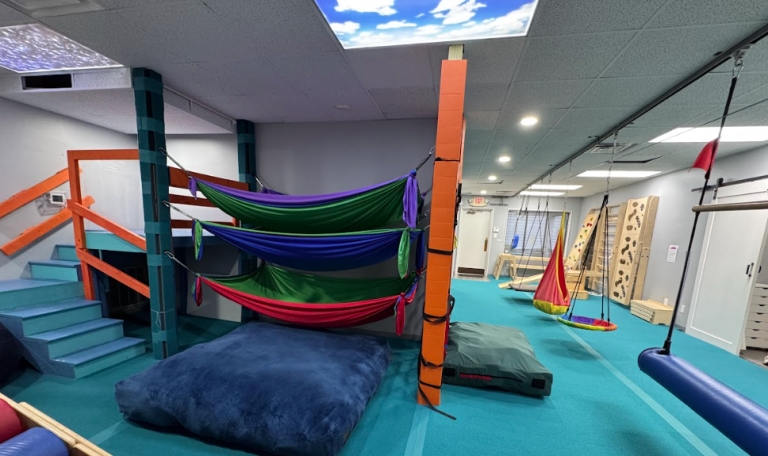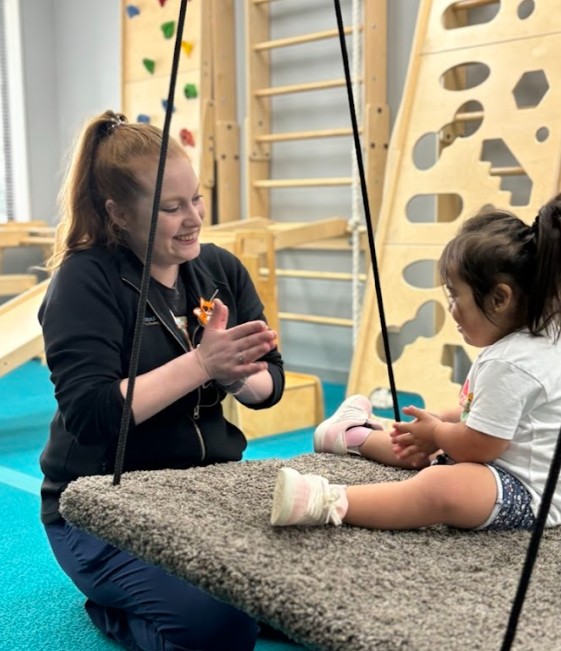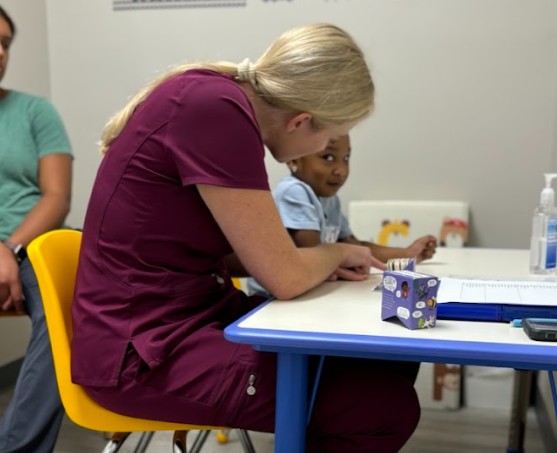Watching your child learn new words, express ideas, and grow into their own personality is one of the greatest joys of parenting. Every child is unique and develops communication skills at their own pace, but sometimes extra support is needed.
If you’re concerned about your child’s speech or language development, you’re not alone—many families in Durham and Chapel Hill have been in your shoes and found support through professional speech therapy.
Speech therapy is about much more than correcting sounds. It’s a critical resource to help children express themselves, understand others, and build confidence for school and social life. In this guide, we’ll walk through what speech therapy is, signs your child may benefit, how therapy sessions work, and how Therapy Smarts supports families on this journey.
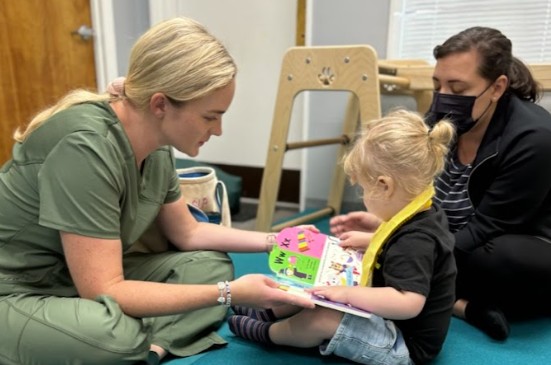
What Is Speech Therapy for Kids?
Speech therapy for kids is a service led by certified Speech-Language Pathologists (SLPs) who help children tackle communication challenges. Therapy may focus on:
- Speech Sound Production: Helping children pronounce words and sounds correctly so they’re easier to understand.
- Language Development: Boosting how children form sentences, use words, understand grammar, and follow directions.
- Social Communication: Teaching kids to pick up on nonverbal cues, participate in conversation, and connect with peers.
- Fluency: Working on speech patterns so kids who stutter or repeat sounds can speak more smoothly.
Our therapists in Durham and Chapel Hill use play-based, engaging activities—like storytelling, games, and crafts—to create a comfortable space for growth.
The Role of Parents in Speech Therapy
Parents play a vital role in their child’s progress during speech therapy. At Therapy Smarts, we work closely with families to support carryover of new skills at home.
Simple routines like reading together, practicing new words, or turning daily activities into language-rich moments can make a world of difference. Our therapists guide you with practical, fun exercises—because your support and encouragement truly accelerate your child’s progress.
How to Tell if Your Child Needs Speech Therapy
Determining whether your child may benefit from speech therapy can feel overwhelming. Children develop at different speeds, but certain signs are red flags. You might want to seek an evaluation if:
- Your child isn’t meeting language milestones, such as babbling by 12-18 months, saying at least 50 words and combining two words by age 2, or being understood by unfamiliar adults by age 3.
- Speech is unclear or hard to understand by age 3, even for family members.
- Your child struggles to follow directions or can’t carry out multi-step requests.
- Stuttering, repetition, or hesitations make speech effortful, lasting more than a few months.
- Limited social interaction, like trouble joining in conversations, reading facial expressions, or maintaining eye contact.
Trust your instincts. If your child’s speech, language, or social skills seem delayed, seeking a speech therapy assessment can bring clarity and peace of mind.
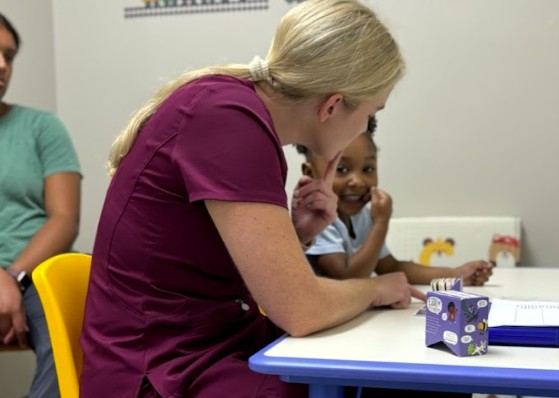
Common Myths About Speech Therapy
There are some misconceptions that can make parents hesitant to seek support. You might hear that “all kids talk late” or that “my child will grow out of it.” While there’s a natural range in language development, persistent challenges deserve attention.
Another myth is that speech therapy only helps with speaking, but in reality, it supports everything from social skills to learning difficulties and reading. Early intervention sets children up for future success—no matter how mild or complex their needs may be.
The Importance of Play in Speech Therapy
Effective therapy is built on play. Children are naturally motivated to explore, discover, and interact through play, which is why we weave storytelling, games, music, and crafts into each session.
This approach keeps children engaged and encourages them to practice new skills in a relaxed environment. Play helps build confidence, nurtures creativity, and transforms therapy into a positive, joyful experience for your child.
What to Expect During Speech Therapy
Every child is different, so speech therapy is always personalized. At Therapy Smarts, we believe therapy should never feel like homework. Children learn best through play! Common approaches include:
- Articulation Exercises: Practicing sounds through fun activities, repetition, and games to improve clarity.
- Language Growth Activities: Using books, stories, pictures, or interactive apps to practice vocabulary and grammar.

- Social Skills Practice: Role-playing conversations or group games to help your child feel confident with peers and adults.
- Fluency Techniques: Simple, supportive strategies to help children who stutter develop smooth, relaxed speech.
We know success is a team effort—our therapists work closely with parents, empowering you with tips and exercises to use at home.
How Speech Therapy Overlaps With Other Therapies
Many children benefit from more than one type of therapy. For example, speech therapy may be combined with:
What It Helps With: Occupational therapy focuses on developing fine motor skills, sensory processing, and daily living tasks. This is essential for children who have trouble holding pencils, using scissors, or dressing themselves.
Local Access: Families searching for occupational therapy in Durham or occupational therapy in Chapel Hill can find programs that work alongside speech therapy to provide well-rounded care.

What It Helps With: Physical therapy focuses on improving gross motor skills, such as walking, running, and balance. For children with developmental delays or physical disabilities, improving motor function can enhance their ability to communicate and participate in social activities.
Local Access: Clinics offering physical therapy in Durham and physical therapy in Chapel Hill often coordinate with speech therapists to ensure a holistic treatment plan.
What It Helps With: Applied Behavior Analysis (ABA) therapy is a highly effective approach for children with autism. ABA therapy helps with behavior management, social skills, and communication.
Local Access: Many clinics providing ABA therapy in Durham and ABA therapy in Chapel Hill integrate speech therapy into their programs to support children with autism more effectively.
What It Helps With: Mental health therapy is designed to help children develop healthy thinking habits, regulate their emotions, and build strong personal relationships. It can help treat mental health conditions such as anxiety, behavior challenges, and depression.
Local Access: Clinics offering kids mental health therapy in Durham and kids mental health therapy in Chapel Hill can collaborate with speech therapists to ensure children can communicate their feelings and reduce feelings of social isolation.

Early Intervention: Why Timing Matters
Early intervention is one of the most important things you can do for your child’s future. Research agrees: the earlier children receive help with speech and language, the better their long-term academic and social results.1 Addressing communication issues before kindergarten helps prevent future struggles and unlocks your child’s full potential.
For more expert information on the importance of early speech therapy, theAmerican Speech-Language-Hearing Association (ASHA) is an excellent, non-competing resource for families.
Therapy Smarts: A Trusted Partner in Your Community
At Therapy Smarts, our experienced, caring team helps children of all ages with speech, feeding, occupational, and physical therapy. We believe every child can thrive with the right support. Our two locations in Durham and Chapel Hill are welcoming, equipped with modern resources, and staffed by knowledgeable therapists who truly care.
We partner with local families and schools, offering coordinated care to meet your child’s unique needs. Whether your child is just getting started or needs more specialized help, we’ll create a therapy plan to help them find their voice and shine.
If you’re ready to learn how Therapy Smarts in Durham and Chapel Hill, NC, can help your child, we invite you to contact us or call 919-378-1340 for a consultation today. Let’s work together for your child’s brighter tomorrow!



